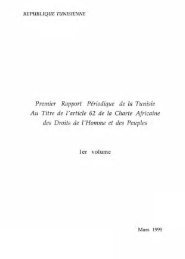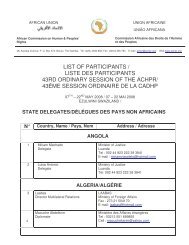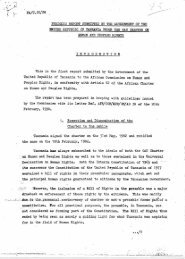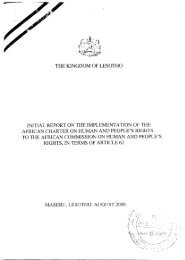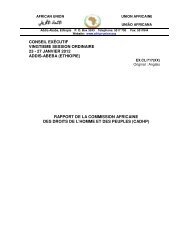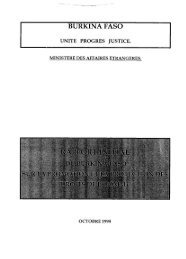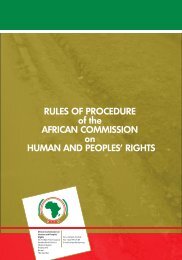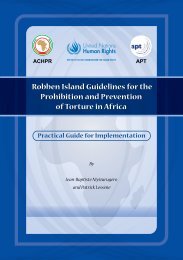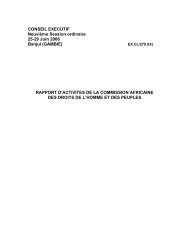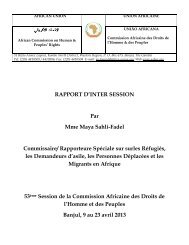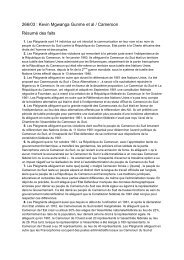Baridorn Wiza) against the Federal Republic <strong>of</strong> Nigeria, adding that in the latter cases, there was pro<strong>of</strong><strong>of</strong> real threat to life. The State goes further to indicate instances where the government hasimplemented court decisions that went against it, adding that even in the present case involving theComplainant, the government respected the Court’s decision.35. The State further indicates that in terms <strong>of</strong> <strong>Zimbabwe</strong> law, it is not a legal requirement for aComplainant to be physically present in the country in order to access local remedies, adding that,both the High Court Act (Chapter 7:06) and the Supreme Court Act (Chapter 7:<strong>05</strong>) permit any personto make an application to either court through his/her lawyer. The State adds that in the Ray Chotoand Mark Chavhunduka case, the victims were tortured by state agents and they applied forcompensation while they were both in the United Kingdom, and succeeded in their claim. The Stateconcludes that the Complainant is not barred from pursuing remedies in a similar manner.36. The State also argues that the communication does not comply with Article 56.6 <strong>of</strong> the Charterwhich provides that a communication should be lodged within a reasonable time after exhaustion <strong>of</strong>local remedies, but where Complainant realises that local remedies shall be unduly prolonged he/shemust submit the complaint to the Commission immediately. According to the State, although theCharter does not specify what constitutes a reasonable time, the Commission should get inspirationfrom the other jurisdictions, including the Inter-American Commission which has fixed six months asreasonable time, adding that even the draft protocol merging the <strong>African</strong> Court <strong>of</strong> Justice and the<strong>African</strong> Court on Human and Peoples’ Rights provides for a six months period.37. The State concludes its submissions by noting that ‘no cogent reasons have been given for thefailure to pursue local remedies or remedies before the Commission within a reasonable time’ and assuch the communication should be declared inadmissible.LawAdmissibilityCompetence <strong>of</strong> the <strong>African</strong> Commission38. In the present communication, the Respondent State raises a preliminary question regarding thecompetence <strong>of</strong> the <strong>African</strong> Commission to deal with this communication. The State aversthat: “basically the facts and issues in dispute do not fall within the rationae materiae and rationaepersonae <strong>of</strong> the jurisdiction <strong>of</strong> the Commission”. This statement questions the competence <strong>of</strong> the<strong>African</strong> Commission to deal with this communication. The Commission will thus first deal with thepreliminary issue <strong>of</strong> its competence raised by the Respondent State.39. Black’s Law Dictionary defines rationae materiae as “by reason <strong>of</strong> the matter involved; inconsequence <strong>of</strong>, or from the nature <strong>of</strong>, the subject-matter.” While rationae personae is defined as “Byreason <strong>of</strong> the person concerned; from the character <strong>of</strong> the person”.40. Given the nature <strong>of</strong> the allegations contained in the communication, notably, allegations <strong>of</strong>violation <strong>of</strong> personal integrity or security, intimidation and torture, the Commission is <strong>of</strong> the view thatthe communication raises material elements which may constitute human rights violations, and assuch it has competence rationae materiae to entertain the matter, because the communication allegesviolations to human rights guaranteed and protected in the Charter. With regards to the Commission’scompetence rationae personae, the communication indicates the name <strong>of</strong> the author, an individual,whose rights under the <strong>African</strong> Charter, the Respondent State is committed to respecting andprotecting. With regards to the State, the Commission notes that <strong>Zimbabwe</strong>, the Respondent State inthis case, has been a State Party to the <strong>African</strong> Charter since 1986. Therefore, both the Complainantand the Respondent State have locus standi before the Commission, and the Commission thus hascompetence rationae personae to examine the communication before it.41. Having decided that it has competence rationae materiae and rationae personae, theCommission will now proceed to pronounce on the admissibility requirements and the contentiousareas between the parties.The <strong>African</strong> Commission’s decision on admissibility
42. The admissibility <strong>of</strong> communications before the <strong>African</strong> Commission is governed by therequirements <strong>of</strong> Article 56 <strong>of</strong> the <strong>African</strong> Charter. This Article provides seven requirements which mustall be met before the <strong>African</strong> Commission can declare a communication admissible. If one <strong>of</strong> theseconditions/requirements is not met, the <strong>African</strong> Commission will declare the communicationinadmissible, unless the Complainant provides justifications why any <strong>of</strong> the requirements could not bemet.43. In the present communication, the Complainant avers that his complaint meets the requirementsunder Articles 56(1),56(2), 56(3), 56(4), 56(6) and 56(7). He indicates that he did not attempt tocomply with the requirement under Article 56dealing with the exhaustion lf local remedies, because <strong>of</strong>the nature <strong>of</strong> his case and the circumstances under which he left the Respondent State, and since heis presently living in South Africa, the exception rule should be invoked. He states that his inability toexhaust local remedies was due to the fact that he had to flee to South Africa for fear for his life.44. The State on the other hand argues that the Complainant has not complied with the provisions <strong>of</strong>Article 56 sub-sections 2, 5 and 6 <strong>of</strong> the Charter, and urges the Commission to declare thecommunication inadmissible based on the non-fulfillment <strong>of</strong> these requirements.45. The admissibility requirements under Article 56 <strong>of</strong> the Charter are meant to ensure that acommunication is properly brought before the Commission, and seeks to sieve frivolous and vexatiouscommunications before they reach the merits stage. As indicated earlier, for a communication to bedeclared admissible, it must meet all the requirements under Article 56. Therefore, if a party contendsthat another party has not complied with any <strong>of</strong> the requirements, the Commission must pronounceitself on the contentious issues between the parties. This however does not mean that otherrequirements <strong>of</strong>Article 56 which are not contested by the parties will not be examined by theCommission.46. Article 56.1 <strong>of</strong> the <strong>African</strong> Charter provides that communications will be admitted if they indicatetheir authors, even if they request anonymity. In the present case the author <strong>of</strong> this communication isidentified as Mr <strong>Obert</strong> <strong>Chinhamo</strong>, he has also not requested that his identity be hidden. TheRespondent State has also been clearly identified as the Republic <strong>of</strong> <strong>Zimbabwe</strong>. Therefore theprovision <strong>of</strong> Article 56.1 has been adequately complied with.47. Article 56.2 <strong>of</strong> the <strong>African</strong> Charter provides that a communication must be compatible with theCharter <strong>of</strong> the OAU or with the <strong>African</strong> Charter on Human and Peoples’ Rights. In the presentcommunication, the Respondent State argues that the communication does not comply with thisrequirement, that is, the communication is not compatible with the provisions <strong>of</strong> the Constitutive Act <strong>of</strong>the <strong>African</strong> Union or the <strong>African</strong> Charter itself. The State asserts in this regard that, for a complaint tobe compatible with the Charter or the Constitutive Act, it must prove a prima facie violation <strong>of</strong> theCharter.48. Compatibility according to the Black’s Law Dictionary denotes ‘in compliance with’ and ‘inconformity with’ or [/quote]‘not contrary to’[/quote] or ‘against’. In this communication, the Complainantalleges among others, violations <strong>of</strong> his right to personal integrity and being subjected to intimidation,harassment and psychological torture, arbitrary detention, violation <strong>of</strong> freedom <strong>of</strong> movement and loss<strong>of</strong> resources occasioned by the actions <strong>of</strong> the Respondent State. These allegations do raise aprimafacie violation <strong>of</strong> human rights, in particular, the right to the security <strong>of</strong> the person or personal integrityand freedom from torture guaranteed in the Charter. Complainants submitting communications to theCommission need not specify which articles <strong>of</strong> the Charter have been violated, or even which right isbeing invoked, so long as they have raised the substance <strong>of</strong> the issue in question. Based on theabove, the <strong>African</strong> Commission is satisfied that in the present communication, the requirement<strong>of</strong> Article 56.2 <strong>of</strong> the <strong>African</strong> Charter has been sufficiently complied with.49. Article 56.3 <strong>of</strong> the Charter provides that a communication will be admitted if they are not written indisparaging or insulting language directed against the State concerned and its institutions or to theOrganisation <strong>of</strong> <strong>African</strong> Unity (<strong>African</strong> Union). In the present case, the communication sent by theComplainant does not, in the view <strong>of</strong> this Commission, contain any disparaging or insulting language,and as a result <strong>of</strong> this, the requirement <strong>of</strong> Article 56.3 has been fulfilled.50. Article 56.4 <strong>of</strong> the Charter provides that the communication must not be based exclusively onnews disseminated through the mass media. This communication was submitted by the Complainant



